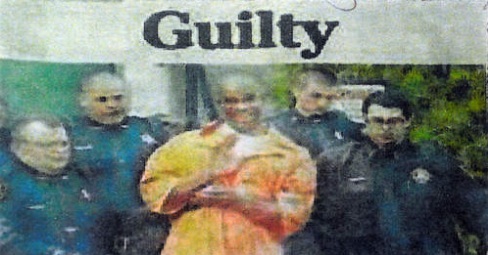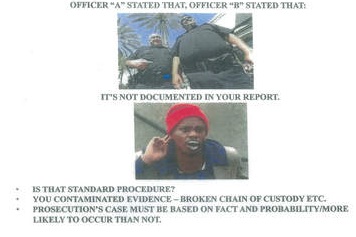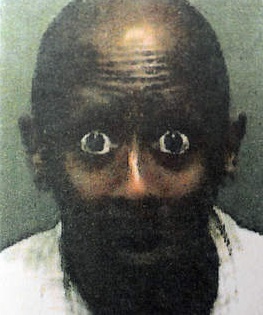North Chicago Police Brochure on how to testify Peppered with Destructive Images of Black Men

From [HERE] On one page, comedian Dave Chappelle appears as Tyrone Biggums, the stumbling junkie with crack residue around his month. On other pages of an official North Chicago police handout, one smiling African American is handcuffed in an orange prison jumpsuit and another is portrayed as bug-eyed and slack-jawed in a mugshot. The handout — given to participants of the new North Chicago Citizen Police Academy last week — was intended to illustrate trial procedures. It had a much different effect.
Waukegan activist Ralph Peterson called the handout “outrageous.” NAACP Lake County Branch President Jennifer Witherspoon said the handout reinforces “every negative stereotype blacks as a people have been fighting against.”


Also in the brochure: Bumbling TV cop Barney Fife, Judge Judy and Lindsay Lohan. On the cover: Lake County State’s Attorney Mike Nerheim opposite Tom Cruise as a military defense attorney from “A Few Good Men.” Nerheim called the handout “incredibly disturbing.”

Apparently the purpose of the brochure is designed to teach officers on how to testify in criminal trials against defendants, who are disproportionately non-white. The white supremacist material mocks the criminal justice system. To these outlaw cops, the best liar wins in court. At best they view their participation in the process like a game show contestant, matching wits with defense attorneys - at worst they simply practice racism (deception) in court. Their goal no doubt is the greater confinement of non-whites. Prosecutors who do not see this reality are in a bullshit utopia.
Cops in Court - Lying isn’t the exception, it’s the rule.
In the context of futile attempts to suppress evidence obtained unlawfully by police in court, criminal defense attorney Kevin Mahoney, who is white, explained the following, [HERE],
"Police recruits are not taught to lie at the Police Academy, and while there is no shortage of unethical prosecutors, I believe only a minority of prosecutors directly instruct police officers to lie. Prosecutors encourage the practice all the same by doing little or nothing to discourage testilying, or, worse, by asking leading questions with winks and nods. Rather than directly and formally encouraging these recruits and officers to commit perjury, these academies and prosecutors teach the upstarts to view defense counsel as lying scoundrels. Cross-examination is a contest, and the outcome is presentation determinative—in other words, the best liar wins.
 The real training is done off the official police grid. More experienced officers teach the newly minted officers how “real” police work is done, how order is maintained on the front lines and how to keep the bad guys off the street. To the experienced officers, perjury is no different from any other tool available to them—whether it be their firearm, their cruiser, or their badge—to combat crime. While no one has admitted as much, at least not to me, I’m convinced that before a hearing on a motion to suppress on an important case with “problems,” the police witnesses meet to map out their testimonies.
The real training is done off the official police grid. More experienced officers teach the newly minted officers how “real” police work is done, how order is maintained on the front lines and how to keep the bad guys off the street. To the experienced officers, perjury is no different from any other tool available to them—whether it be their firearm, their cruiser, or their badge—to combat crime. While no one has admitted as much, at least not to me, I’m convinced that before a hearing on a motion to suppress on an important case with “problems,” the police witnesses meet to map out their testimonies.
What have experienced police officers seen of society that impresses upon them to so prize the truth? Lying isn’t the exception, it’s the rule. From the president on down, it’s all spin, all the time. Officers are often on the receiving end of malicious, career-threatening lies. To extricate themselves from trouble, defendants manufacture outright lies against the officers who arrested them. Women who retreated to locked bathrooms, bruised and bloodied, to dial 911 and report their abusive husbands, later deny their husbands struck them and accuse the responding officers of brutality. Testilying is not excusable, but it is understandable.
In my experience, most judges are, at best, indifferent to police perjury. So untroubled are some judges by obvious perjury that there seems to be an unspoken agreement: the cop pretends he is testifying truthfully, and the judge pretends he believes the testimony. Other judges, feeling a small tug to act conscientiously, will do their best to reconcile the irreconcilable. In the end, despite your winning issue and blistering cross-examination, the judge’s findings mirror the officers’ testimony, and he denies the motion. To reach such absurd factual conclusions, this robed jurist, like a starving man in some third world country, must have sifted through a pile of testimonial excrement to find something edible. A judge willing to pick through the excrement is green-lighting perjury.
If testilying is, in the end, understandable, make it understandable to the judge and to the jury."